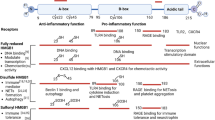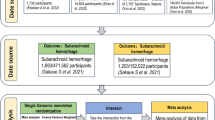Abstract
Although glutamate toxicity is important in stroke injury, the immune and inflammatory systems are also related to stroke pathogenesis. Tumor necrosis factor (TNF) receptor superfamily member 5 (CD40) plays a crucial role in mediating a broad variety of immune and inflammatory responses. To investigate whether CD40 polymorphisms are associated with the development of ischemic stroke, two promoter single nucleotide polymorphisms (SNPs) of the CD40 gene (rs1800686, −508A/G; rs752118, −173C/T) were analyzed in 121 patients with ischemic stroke (IS) and 291 control subjects. All stroke patients were classified into clinical subgroups according to their blood pressure levels (hypertension, present and absent), fasting plasma glucose (diabetes mellitus, present and absent), and lipids (dyslipidemia, present and absent). SNPStats and SNPAnalyzer Pro software were used to obtain odds ratios (ORs), 95% confidence intervals (CIs), and Pvalues. Multiple logistic regression models (codominant1, codominant2, dominant, recessive, overdominant, and log-additive) were used to analyze the genetic data. The two tested CD40 promoter SNPs (rs1800686 and rs752118) were not associated with the development of IS, but the GT haplotype of these two SNPs was associated with the development of IS (P= 0.0148). The rs1800686 SNP frequency differed between IS patients without hypertension and those with hypertension (P=0.017, OR=0.17, 95% CI=0.04–0.72 in the codominant2 model; P=0.023, OR=0.37, 95% CI=0.15–0.90 in the dominant model; P=0.0085, OR=0.42, 95% CI=0.21–0.81 in the log-additive model; P=0.011, OR=0.47, 95% CI=0.27–0.85 in allele frequencies). The A allele frequency of rs1800686 was lower in IS patients with hypertension (27.2%) than in IS patients with hypertension (44.3%), while the G allele frequency of rs1800686 was higher in IS patients with hypertension (72.8%) than in IS patients with hypertension (55.7%). These results suggest that the GT haplotype of rs1800686 and rs752118 in the CD40 gene may be associated with the development of IS, and rs1800686 may contribute to IS in Korean patients with hypertension.
Similar content being viewed by others
References
Marsh, J. D. & Keyrouz, S. G. Stroke prevention and treatment. J Am Coll Cardiol 56:683–691 (2010).
Grysiewicz, R. A., Thomas, K. & Pandey, D. K. Epidemiology of ischemic and hemorrhagic stroke: incidence, prevalence, mortality, and risk factors. Neurol Clin 26:871–895 (2008).
Lanktree, M. B., Dichgans, M. & Hegele, R. A. Advances in genomic analysis of stroke: what have we learned and where are we headed? Stroke 41:825–832 (2010).
Somarajan, B. I., Kalita, J., Mittal, B. & Misra, U. K. Evaluation of MTHFR C677T polymorphism in ischemic and hemorrhagic stroke patients. A case-control study in a Northern Indian population. J Neurol Sci 304:67–70 (2011).
Li, X., Su, D., Zhang, X. & Zhang, C. Association of apolipoprotein A5 gene promoter region -1131T>C with risk of stroke in Han Chinese. Eur J Intern Med 22:99–102 (2011).
Chabot, S., Charlet, D., Wilson, T. L. & Yong, V. W. Cytokine production consequent to T cell-microglia interaction: the PMA/IFN gamma-treated U937 cells display similarities to human microglia. J Neurosci Methods 105: 111–120 (2001).
Grewal, I. S. & Flavell, R. A. CD40 and CD154 in cellmediated immunity. Annu Rev Immunol 16:111–135 (1998).
Schumacher, H. et al. Immunophenotypic characterisation of carotid plaque: increased amount of inflammatory cells as an independent predictor for ischaemic symptoms. Eur J Vasc Endovasc Surg 21:494–501 (2001).
Kassner, S. S. et al. The early immunological response to acute ischemic stroke: differential gene expression in subpopulations of mononuclear cells. Neuroscience 160: 394–401 (2009).
Ishikawa, M. et al. CD40/CD40 ligand signaling in mouse cerebral microvasculature after focal ischemia/reperfusion. Circulation 111:1690–1696 (2005).
Cha, J. K. et al. Surface expression of P-selectin on platelets is related with clinical worsening in acute ischemic stroke. J Korean Med Sci 17:811–816 (2002).
Luomala, M. et al. Plasma-soluble CD40 is related to cholesterol metabolism in patients with moderate hypercholesterolemia. Scand Cardiovasc J 40:280–284 (2006).
Lobbes, M. B. et al. Is there more than C-reactive protein and fibrinogen? The prognostic value of soluble CD40 ligand, interleukin-6 and oxidized low-density lipoprotein with respect to coronary and cerebral vascular disease. Atherosclerosis 187:18–25 (2006).
Kim, Y. S., Yoo, J. H. & Lee, B. C. Susceptibility for ischemic stroke in Korean population is associated with polymorphisms of the Fc gamma receptor IIA. Blood Coagul Fibrinolysis 20:353–357 (2009).
Lee, B. C. et al. Susceptibility for ischemic stroke in Korean population is associated with polymorphisms of the interleukin-1 receptor antagonist and tumor necrosis factor-alpha genes, but not the interleukin-1beta gene. Neurosci Lett 357:33–36 (2004).
Um, J. Y. & Kim, H. M. Polymorphisms of RANTES and IL-4 genes in cerebral infarction. J Mol Neurosci 37:1–5 (2009).
Tan, J. et al. CD40 is expressed and functional on neuronal cells. EMBO J 21:643–652 (2002).
Inwald, D. P., McDowall, A., Peters, M. J., Callard, R. E. & Klein, N. J. CD40 is constitutively expressed on platelets and provides a novel mechanism for platelet activation. Circ Res 92:1041–1048 (2003).
Cha, J. K. et al. Serial measurement of surface expressions of CD63, P-selectin and CD40 ligand on platelets in atherosclerotic ischemic stroke. A possible role of CD40 ligand on platelets in atherosclerotic ischemic stroke. Cerebrovasc Dis 16:376–382 (2003).
Garlichs, C. D. et al. Upregulation of CD40-CD40 ligand (CD154) in patients with acute cerebral ischemia. Stroke 34:1412–1418 (2003).
del Rio-Espinola, A. et al. CD40-1C>T polymorphism (rs1883832) is associated with brain vessel reocclusion after fibrinolysis in ischemic stroke. Pharmacogenomics 11:763–772 (2010).
Wang, M., Li, Y., Li, W., Xia, Z. E. & Wu, Q. The CD40 gene polymorphism rs1883832 is associated with risk of acute coronary syndrome in a Chinese case-control study. DNA Cell Biol 30:173–178 (2011).
Rodriguez-Rodriguez, L. et al. Influence of CD40 rs1883832 polymorphism in susceptibility to and clinical manifestations of biopsy-proven giant cell arteritis. J Rheumatol 37:2076–2080 (2010).
Pineda, B. et al. Gene-gene interaction between CD40 and CD40L reduces bone mineral density and increases osteoporosis risk in women. Osteoporos Int 22:1451–1458 (2010).
Raychaudhuri, S. et al. Common variants at CD40 and other loci confer risk of rheumatoid arthritis. Nat Genet 40:1216–1223 (2008).
Skibola, C. F. et al. A functional TNFRSF5 gene variant is associated with risk of lymphoma. Blood 111:4348–4354 (2008).
Author information
Authors and Affiliations
Corresponding author
Rights and permissions
About this article
Cite this article
Cho, JM., Choe, BK., Zheng, R. et al. Association between CD40 promoter polymorphism (rs1800686, −508 C/T) and ischemic stroke with hypertension in a Korean population. Mol. Cell. Toxicol. 8, 257–262 (2012). https://doi.org/10.1007/s13273-012-0031-7
Received:
Accepted:
Published:
Issue Date:
DOI: https://doi.org/10.1007/s13273-012-0031-7




